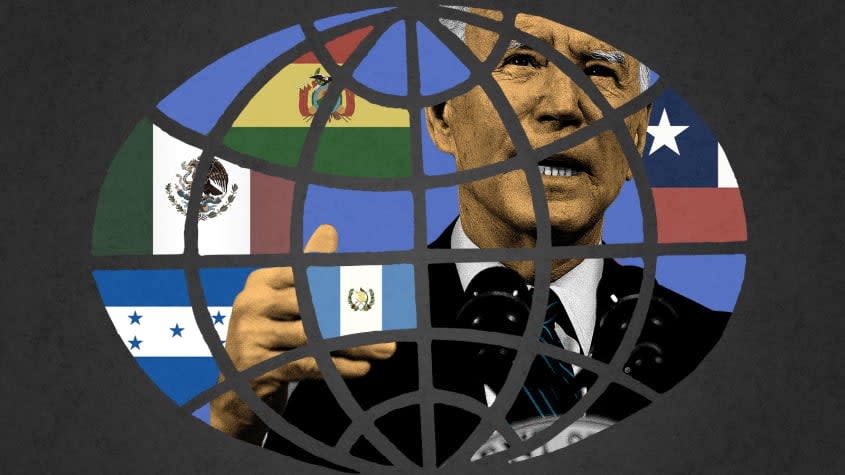The challenges facing the Summit of the Americas

The U.S. will host the Ninth Summit of the Americas from June 6 to June 10 in Los Angeles, where leaders from the Western hemisphere will come together following a pandemic-related delay for the first time since 2018. Here's everything you need to know:
What is the Summit of the Americas?
Founded in 1994, the Summit of the Americas — organized by the Organization of American States and held roughly every three to four years — is the only hemispheric meeting of leaders from North, South, and Central America, and "serves as the most important forum" to address the region's "shared challenges and opportunities," per the U.S. State Department. The 2022 summit marks the first time the U.S. has hosted the event since the inaugural meeting in Miami in 1994.
In the past, such summits — which afford Latin American leaders one of their only opportunities to get important face time with the president of the United States and the prime minister of Canada, per the Latin America in Focus podcast — have launched trade, democracy, environment, education, social, economic, and anti-corruption efforts, the Americas Society/Council of the Americas notes. This year, the summit is themed around "Building a Sustainable, Resilient, and Equitable Future," and will focus on four main priority areas: "curbing record migration, boosting economic growth, combating climate change and bolstering recovery from the COVID-19 pandemic," the Los Angeles Times summarizes.
So, who's going?
That question is possibly the most contentious of the summit thus far, considering invitations were only recently sent out and notably excluded Venezuela, Cuba, and Nicaragua. The U.S. has said the omission is thanks to the countries' autocratic governments, but all three have been invited before, AS/COA's Senior Director Steve Liston told Latin America in Focus. And importantly, writes John Kirk, professor emeritus of Latin American studies at Dalhousie University in Canada, for Al Jazeera, it's not as though the other nations that were invited are "paragons" of democratic values — in Mexico, for example, a slew of journalists have been murdered this year alone, Kirk pointed out.
In protest of the exclusions, some Latin American leaders have threatened to boycott the summit unless the U.S. invites every country in the hemisphere (as the host, the U.S. controls the guest list). Mexican President Andres Manuel Lopez Obrador, for instance, has said he won't confirm his attendance until he knows all nations received an invitation. Bolivia, Chile, Honduras, and most of the Caribbean have also threatened to pull what would be an "embarrassing" summit snub. The president of Guatemala previously said he would be absent from the meeting, though perhaps he'll send a delegate in his place.
However, Venezuela's Juan Guaidó, who the U.S. recognizes as the nation's leader over Nicolás Maduro, is reportedly a confirmed attendee, per the Council on Foreign Relations. Brazil's Jair Bolsonaro will also reportedly be making an appearance,
What challenges does the summit face?
Aside from the whole invitee and boycott debacle, the summit has taken some heat for its rather messy appearance and last-minute planning — an approach not exactly in keeping with what administration officials had previously described as a "top-priority event for relations in the United States' own neighborhood," CNN summarizes. And then, well, there's just everything else that's been going on.
"We've had an election, a new president, a pandemic, all our own domestic issues, as well as a lot of regional issues that have made it very difficult to reach consensus and to do what is normally a two to three-year process of negotiation on what should be coming out of the summit," AS/COA's Liston told Latin America in Focus.
The meeting also arrives as the region faces a multitude of key challenges, like the ongoing COVID-19 pandemic, migration and security, climate change, and political polarization, writes CFR.
What should hemisphere leaders hope to achieve?
Liston said he'd love to see attendees make a "commitment to moving forward on the things that are going to make our hemisphere succeed," like readying healthcare systems for the next pandemic, or ensuring trade and investment on new and key economic issues. And not just that — even if meaningful commitments are made, Liston said he hopes leaders introduce a process to follow up and make those promises a reality.
What do critics think of the event?
"Since its inception, the meeting has failed to deliver," former Obama administration official Dan Restrepo wrote recently for the Los Angeles Times, arguing the summit to be a "fatally flawed forum that doesn't serve its purpose and limits our country's focused attention on its closest neighbors." Rather, Restrepo posits, Biden should opt out of the summit and instead "propose separate regional meetings with the leaders of the countries of Central America, the Caribbean and South America, on a rotating annual basis."
While writing for Al Jazeera, John Kirk also criticized the upcoming event as more of a "summit of regional U.S. allies," considering the omissions in the guest list. "The U.S. decision to pick and choose, rather than host a genuine Summit of the Americas, is unfortunate," Kirk writes. "What is now shaping up is a Summit of U.S. Regional Friends, a lost opportunity for Washington to deal honestly with major regional challenges."
You may also like
7 cartoons about America's gun crisis
5 cartoons about the Uvalde police response
Queen Elizabeth has tea with Paddington Bear in video shown at Jubilee concert

